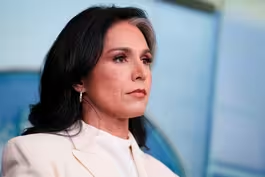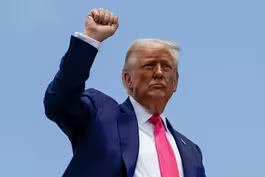
National parks struggle with funding and staffing cuts
Clip: 7/23/2025 | 8m 51sVideo has Closed Captions
How the National Parks Service is struggling with drastic funding and staffing cuts
Summer is the height of the visitor season for the National Park Service. Last year, nearly 332 million people visited NPS sites, a record that is likely to be broken this year. That surge in visitors continues despite staff and budget cuts imposed by the Trump administration with no end in sight. Stephanie Sy discussed more with Theresa Pierno of the National Parks Conservation Association.
Problems playing video? | Closed Captioning Feedback
Problems playing video? | Closed Captioning Feedback
Major corporate funding for the PBS News Hour is provided by BDO, BNSF, Consumer Cellular, American Cruise Lines, and Raymond James. Funding for the PBS NewsHour Weekend is provided by...

National parks struggle with funding and staffing cuts
Clip: 7/23/2025 | 8m 51sVideo has Closed Captions
Summer is the height of the visitor season for the National Park Service. Last year, nearly 332 million people visited NPS sites, a record that is likely to be broken this year. That surge in visitors continues despite staff and budget cuts imposed by the Trump administration with no end in sight. Stephanie Sy discussed more with Theresa Pierno of the National Parks Conservation Association.
Problems playing video? | Closed Captioning Feedback
How to Watch PBS News Hour
PBS News Hour is available to stream on pbs.org and the free PBS App, available on iPhone, Apple TV, Android TV, Android smartphones, Amazon Fire TV, Amazon Fire Tablet, Roku, Samsung Smart TV, and Vizio.
Providing Support for PBS.org
Learn Moreabout PBS online sponsorshipGEOFF BENNETT: Summer is the height of the visitor season for the National Park Service.
AMNA NAWAZ: Last year, there were nearly 332 million visitors to U.S. national parks, monuments and historic sites, a record that will likely be broken again this year.
Stephanie Sy has this report.
STEPHANIE SY: That surge in visitors continues, despite staff and budget cuts imposed by the Trump administration, with no end in sight.
The Big Beautiful Bill rescinded $267 million earmarked for park improvements and the administration has proposed a further 38 percent budget cut next year.
Advocates say it's already having a dramatic impact on park operations.
We spoke to some of them.
JESSE CHAKRIN, Executive Director, The Fund For People in Parks: My name is Jesse Chakrin, and I am the current executive director of The Fund for People in Parks.
Previous to that, I spent over 20 years working for the Park Service between Denali National Park and Yosemite.
KEVIN HEATLEY, Former Superintendent, Crater Lake National Park: My name is Kevin Heatley, and I'm the former superintendent of Crater Lake National Park in Klamath Falls, Oregon.
KEN YAGER, President and Founder, Yosemite Climbing Association: My name is Ken Yager.
And I have been in Yosemite since 1976.
And I am currently the president and founder of Yosemite Climbing Association.
JESSE CHAKRIN: I will say that morale is as low as I have ever seen it in 24 years.
Many friends and colleagues are near tears or in tears on a daily basis.
It is heartbreaking, to say the least.
The KEVIN HEATLEY: The inability to hire additional permanent staff to replace people, the disruptions that occurred with respect to our ability to make purchases for vital essential items, the open hostility towards public sector employees, it was an unacceptable, untenable situation.
You cannot operate efficiently in that kind of environment.
And I knew that in long term this was being set up to fail, and I didn't want to be a part of that.
KEN YAGER: An area can stay really clean for most of the year, and then once the trash starts getting dumped there, then people add to it, because they figure, oh, somebody else dumped it there, somebody's going to come along and clean it up.
Well, got news for you.
People aren't being paid to clean it up.
JESSE CHAKRIN: There are so many jobs that people do not see in national parks.
It's like running a small city.
And so every reduction in staff leads to a reduction in services.
The public may show up and the doors are locked.
The beaches are less safe.
The trails are going to have more litter.
The trash cans will be emptied less frequently.
You know, these things feel like small things if you talk about them individually.
In aggregate, it is the fracturing of the foundation of the national park system that is entrusted with the democratic ideals of our country.
KEVIN HEATLEY: These directives were not coming through the National Park Service.
They were coming from DOGE or they were coming from the Office of Personnel Management, OPM.
So they do not understand they didn't take the initiative.
They didn't take the time.
If you were going to do an efficiency study and come into an organization and try to enhance efficiency, the first thing you would do is get on the ground and understand how the organization works.
And they did not do that.
KEN YAGER: I think the endgame is to get rid of the Park Service.
If you can make them so poorly organized and so poorly run that people don't -- can see it and they want to get rid of the Park Service, it will be that much easier for them to, hey, let's defund the Park Service, and we will just take a percentage of the concessionaire.
I have a feeling they're going to put concessionaires in charge to run the whole operation.
And that's like putting the wolf in the chicken coop.
JESSE CHAKRIN: I hope that the American public will continue to care about and advocate for their national park system.
It is truly a treasure of the world and it is one of the beating hearts of our democracy.
STEPHANIE SY: Joining me now to discuss the state of the national parks is Theresa Pierno.
She's the president and CEO of the National Parks Conservation Association.
Theresa, your organization put out a report earlier this month that found that the National Park Service has lost 24 percent, nearly a quarter, of its permanent staff since January.
There are nearly 100 vacant superintendent positions, and seasonal hiring is not filling a lot of gaps.
You just heard others, Theresa, describe the impacts on morale.
How major are these staffing shortages and how do you think park visitors will be experiencing them?
THERESA PIERNO, President and CEO, National Parks Conservation Association: I think, as you heard from others, the parks are at a real crisis point.
I mean, not only were they going into this year understaffed, but then there's a hiring freeze.
Then you see a reduction of 24 percent is enormous, over 4,000 staff members.
And then there's still the potential for even additional reductions.
Besides that, the hiring freeze continues.
So we have many superintendents, hundreds of superintendent positions vacant, maintenance workers.
Workers that do the essential jobs within a park so that a visitor can have an excellent experience are vacant, and they can't fill them.
And the other thing, they can't spend any money without permission.
So it's a really difficult, demoralizing situation.
STEPHANIE SY: Well, the Interior Department, Theresa, sent us this statement, saying it is implementing necessary reforms to ensure fiscal responsibility, operational efficiency, and government accountability.
They say: "The National Park Service is diligently working to meet the evolving needs of visitors, ensuring memorable and meaningful experiences for all."
Are these efficiencies what's needed?
THERESA PIERNO: Well, absolutely not.
They're not efficiencies.
It's in no way efficient to take a beautiful jewel, a crown jewel of this nation, our national park system, that is beloved by millions of people across the country, and not only demoralize the staff and reduce the staff to the point where the leadership has been eliminated in many parks, where the maintenance, the ability to be able to even bring visitors in, open campgrounds -- we have seen parks have to close parts of the park and change hours and things like that because of the fact that it's so understaffed.
And what we also have to recognize is that, for every dollar invested in our national parks, it returns $15 to the economy.
And that's in the hotels and the food service and all of the things that people do when they come to our national parks, the communities around the parks.
Thousands of people are hired in jobs that are connected to the visitors of the parks.
STEPHANIE SY: I want to ask you something else.
Another executive order that the president has put out has instructed the Park Service to review plaques, displays, remove materials that are deemed -- quote -- "inappropriately disparaging of Americans."
The New York Times, as you may know, reported this week that Park Service employees have been flagging descriptions and displays at scores of parks for Trump administration review.
Zoom out.
Bigger picture, what is the mission of national parks?
Who are they for?
And how do these changes, the budget changes and potentially the display of names and displays, fit into all of that?
THERESA PIERNO: Well, I think as most people understand our national parks are really the place that preserves our history.
And national park rangers are the most beloved and important storytellers in this nation.
The historians, the people that talk -- if you go to some of our sites like Gettysburg and walk through that hallowed ground and hear about the battle and hear about what happened, what were the real details, it's something that will move you will remember for the rest of your life.
And so to erase and to even think about racing history and erasing these stories or changing how you tell them, so that they no longer are actually factual or follow what the history has told us, is just unfathomable.
Where do you go to learn about those things?
It's our national park sites.
And so we have to protect them.
STEPHANIE SY: Theresa Pierno with the National Parks Conservation Association, thank you.
THERESA PIERNO: Thank you so much.
Gabbard sows doubt on Russia probe as Trump faces pressure
Video has Closed Captions
Clip: 7/23/2025 | 5m 36s | Gabbard pushes report on Obama and Russia probe as Trump faces pressure over Epstein (5m 36s)
GOP and Democratic strategists on Trump's Epstein connection
Video has Closed Captions
Clip: 7/23/2025 | 7m 55s | GOP and Democratic strategists analyze renewed focus on Trump's connection with Epstein (7m 55s)
Iran will continue uranium enrichment despite U.S. strikes
Video has Closed Captions
Clip: 7/23/2025 | 1m 30s | Iran says it will continue uranium enrichment despite U.S. strikes on nuclear facilities (1m 30s)
Loretta Ross explores a new way to face disagreements
Video has Closed Captions
Clip: 7/23/2025 | 8m 8s | 'Tell me more': Activist Loretta Ross explores a new way to face disagreements (8m 8s)
News Wrap: Aid groups warn of starvation and death in Gaza
Video has Closed Captions
Clip: 7/23/2025 | 7m 38s | News Wrap: Aid groups warn of 'chaos, starvation and death' in Gaza (7m 38s)
What's in Trump's new AI policy and why it matters
Video has Closed Captions
Clip: 7/23/2025 | 6m 37s | What's in Trump's new AI policy and why it matters (6m 37s)
What the new trade deal with Japan means for the U.S.
Video has Closed Captions
Clip: 7/23/2025 | 6m 30s | What the new trade deal with Japan means for U.S. businesses and consumers (6m 30s)
Providing Support for PBS.org
Learn Moreabout PBS online sponsorshipSupport for PBS provided by:
Major corporate funding for the PBS News Hour is provided by BDO, BNSF, Consumer Cellular, American Cruise Lines, and Raymond James. Funding for the PBS NewsHour Weekend is provided by...


















